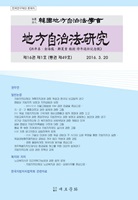헌법적 관점에서 본 지방출자출연법의 법적 과제
Legal Issues of the Act on the Operation of Local Government-Invested or -Funded Institutions from Constitutional Perspectives: Focusing on Ensuring Autonomy in Operating the Institution
- 51

과거에는 지방출자출연기관에 대한 일관적이고 체계적인 규율 및 공통의 적용 기준 등은 존재하지 아니하여, 설립승인과 운영상의 관리·감독 사항들을 각각의 개별 법률로 규정하였다. 또한, 지방출자출연기관에 대한 입법적 차원에서의 체계적 관리가 미흡하다 보니 각종 채용 비리, 부실 경영 및 예산 남용 등의 다양한 문제점들도 발생하게 되었다. 이에, 지방출자출연기관 운영 과정의 부패 유발 소지를 제거하고 기관 운영의 투명성·책임성 확보를 위해서 지방출자출연기관 규율의 소관 부처인 당시의 안전행정부는 지방출자출연기관에 대한 규율 사항들의 법제화를 추진하였는데, 그 결과 「지방자치단체 출자·출연 기관의 운영에 관한 법률」이라는 단일의 법률을 2014년 3월 24일 제정하고 동년 9월 25일 시행하였다. 하지만, 동법은 당시의 시대적 상황에만 매몰되어 기관 운영의 투명성과 책임성만을 강조한 나머지 기관 운영의 독립성 내지 자율성의 측면은 크게 주목하지 못하였다. 결국, 부정부패 등 도덕적 해이, 자의적이고 불투명한 기관 운영 등을 예방하기 위해 현행법에 상당 부분 반영이 완료된 책임성 확보의 관점이 아닌 그간 소홀하게 다루어진 기관 운영의 자율성 확보의 관점에서 현행 지방출자출연법의 법적 검토의 필요성이 제기된다고 하겠다. 이에, 본 연구에서는 지방출자출연기관의 법적 정의, 특성, 등장 배경 및 입법적 규율 연혁 등 동 기관을 이해하기 위한 주요 내용들을 법적인 측면에서 개관해 보았고, 헌법상 지방자치제도와 지방자치단체의 전권한성과 자기책임성, 그리고 헌법상 사회국가원리와 경제에 관한 규제와 조정의 관점에서 지방출자출연기관의 설립과 운영의 헌법적 근거를 검토하였으며, 이와 함께 지방출자출연기관 운영의 효율성 확보 조건으로서 자율성의 보장을 강조하였다. 또한, 설립, 운영, 해산 등 지방출자출연기관에 관한 전반적인 사항을 규율하는 현행 지방출자출연법을 제정 배경 및 입법 취지와 주요 내용을 중심으로 분석하였고, 마지막으로 이상의 논의를 바탕으로 기관 운영의 자율성 강화의 측면에서 현행법의 문제점을 도출하고 그 개선 방향을 제시하였으며, 추가적으로 법 개정 전 현행법의 합리적이고 적절한 해석을 통한 기관 운영의 자율성 부여 방안까지 제안하였다. 구체적으로 본 연구는 지방출자출연법의 전체적인 규율 방향의 재정립, 지방출자출연기관의 개념 및 사업범위 명확화, 지방출자기관과 지방출연기관의 분리 규율, 정부출연기관과 지방출연기관 간의 차별 해소 등의 과제를 해결하기 위해 기관 운영의 자율성 보장의 관점에서 현행 지방출자출연법의 개정 방향을 검토하였고, 지방출자출연법상의 ‘협의’ 등의 의미를 형식적이고 요식적인 행위로 한정적으로 해석할 것을 제안하였다.
In the past, consistent and systematic discipline and common application standards for local government-invested or -funded institutions did not exist, so establishment approval and operational management and supervision matters were regulated by individual laws. In addition, due to the lack of systematic management at the legislative level for the institutions, various problems such as various recruitment irregularities, poor management, and budget abuse have occurred. Accordingly, in order to eliminate the possibility of causing corruption in the operation process of the institutions and ensure transparency and accountability in the operation of the institutions, the Ministry of Security and Public Administration at the time, which was in charge of discipline of the institutions, legislated the disciplinary matters for the institutions. As a result, a single law called the “Act on the Operation of Local Government-Invested or -Funded Institutions” was enacted on March 24, 2014 and went into effect on September 25 of the same year. However, the Act was buried only in the circumstances of the time and only emphasized transparency and accountability in the operation of the institutions, so it did not pay much attention to the aspects of independence or autonomy in the operation of the institutions. Ultimately, there is a need to legally review the current Act, and this review should be done from the perspective of securing autonomy in the operation of institutions that have been neglected so far. This is because the perspective of securing accountability to prevent moral hazard, such as corruption, and arbitrary and opaque institutional operations has already been largely reflected in the current Act. Accordingly, this study provides a legal overview of key contents for understanding the institutions, including their legal definition, characteristics, background of emergence, and history of legislative regulations. In addition, the constitutional basis for the establishment and operation of the institutions was reviewed from the perspective of the constitutional local autonomy system, the full authority and self-responsibility of local governments, and the constitutional social state principles and regulation and coordination of economic affairs. Furthermore, the guarantee of autonomy was emphasized as a condition for ensuring the efficiency of operating the institutions. Additionally, the current Act, which governs overall matters related to the institutions, including establishment, operation and dissolution, was analyzed focusing on the background, legislative purpose and main contents of the enactment. Finally, based on the above discussion, problems with the current law were identified in terms of strengthening the autonomy of institutional operations and directions for improvement were presented. In addition, a plan to grant autonomy in the operation of the institutions through reasonable and appropriate interpretation of the current law before the revision of the law was also proposed. Specifically, this study reviewed the direction of revision of the current Act in terms of ensuring autonomy in the operation of institutions to solve issues such as re-establishing the overall disciplinary direction of the Act, clarifying the concept and business scope of the institutions, regulating the separation of local government-invested institution and local government-funded institution, and resolving discrimination between government-funded institution and local government-funded institution. And this study proposed that the meaning of 'consultation' in the Act be limitedly interpreted as a formal and red tape act.
Ⅰ. 서 론
Ⅱ. 지방출자출연기관의 법적 개관
Ⅲ. 지방출자출연기관 운영의 자율성 보장을 위한 헌법적 검토
Ⅳ. 지방출자출연법의 제정 배경 및 주요내용
Ⅴ. 지방출자출연법의 개정 방향
Ⅵ. 결 론
(0)
(0)